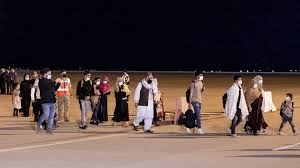The European Union has raised concerns over the repatriation of Afghan nationals, saying that Pakistan’s action is not in line with its commitments towards international laws, The News reported Friday.
More than 200,000 people have left Pakistan in a mass exodus after the government’s deportation orders of up to 1.7 million illegal migrants. The government had given an ultimatum to the undocumented foreigners, saying they would face arrest and expulsion after November 1.
Pakistan has said the deportations are to protect its “welfare and security” after a sharp rise in attacks, which the government blames on militants operating from Afghanistan.
During a mid-day briefing, a spokesperson for the European External Action Service, Peter Stano, said: “We are monitoring the situation and we are not only in contact with Pakistan’s authorities but also with the international aid agencies working in Pakistan and Afghanistan.”
He said the repatriation of one million illegal Afghan immigrants in Pakistan is raising many questions, particularly in the context that they belong to different ethnic groups.
“Our general position is that Pakistan’s action is not in line with its commitments towards international laws, particularly in the situation when the Taliban government in Afghanistan is against women’s rights and various ethnic groups,” said Stano.
The spokesperson added the EU has conveyed its concerns to the Pakistan government because when the forcibly repatriated immigrants will try to return to Pakistan due to unfavourable circumstances in Afghanistan, their lives will be in more danger.
“It is a matter of concern and we are in contact with our partners and Pakistan’s government,” Stano said.
Afghans continue to return from Iran
Meanwhile, Iran’s top border official said a day earlier that the number of Afghans coming home from Iran has doubled in the past month.
At least 14,480 Afghans have crossed at Islam Qala in four days since the weekend, said Abdullah Qayomi, head of refugee affairs at the busy crossing near the western Afghan city of Herat.
“Iran has not announced it (that they are deporting Afghans) but continuously there is no decline in our figures, they are only increasing day by day,” Qayomi said.
Afghans arriving at Islam Qala report being detained and deported, even if some of them had documents allowing them to be in Iran.
Iran, which shares a 900-kms border with Afghanistan, hosts one of the largest refugee populations in the world, made up mostly of well-integrated Afghans who arrived over the past 40 years after fleeing conflict. An estimated 4.5 million Afghans currently live in Iran, according to the International Organisation for Migration, though Tehran estimates there are more than five million.
















































